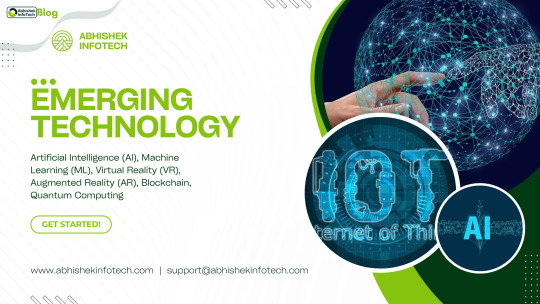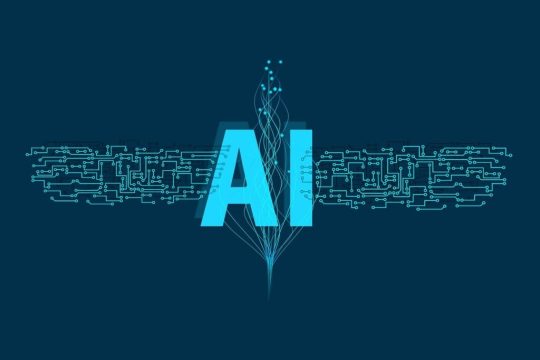#ExploringtheLatestBreakthroughsinAI
Explore tagged Tumblr posts
Text
How Emerging Technologies like AI, VR, AR, Blockchain, and Quantum Computing Are Changing the World?

Navigating the Frontiers of Innovation: Exploring Emerging Technologies
Introduction of Emerging Technology In a time of swift tech progress, emerging innovations reshape interactions and industries. AI, VR, AR, blockchain, and quantum computing promise life-changing transformations. Join us on a journey exploring these technologies' intricacies and broad impacts.
1. Artificial Intelligence (AI)
Artificial Intelligence, the "fourth industrial revolution," crafts smart machines mirroring human thought. Machine Learning (ML) and Deep Learning (DL) enable data-driven learning and informed choices. AI excels in healthcare, finance, manufacturing, and entertainment, automating tasks and enriching experiences.
2. Virtual Reality (VR) and Augmented Reality (AR)
Virtual Reality immerses users in simulated environments, while Augmented Reality overlays digital information onto the real world. VR finds its footing in gaming, training, and therapy, offering immersive experiences that transport users to new realms. AR, on the other hand, enhances real-world scenarios, enabling interactive learning, navigation, and entertainment. These technologies shook up entertainment, real estate, and education, altering our perception and interactions with the world.
3. Blockchain
Blockchain, a decentralized and secure digital ledger, is transforming industries like finance, supply chain, and healthcare. By enabling transparent and tamper-proof records, blockchain enhances trust and reduces intermediaries in transactions. Cryptocurrencies, such as Bitcoin and Ethereum, leverage blockchain for secure and borderless financial transactions. Beyond finance, blockchain's potential extends to identity management, voting systems, and ensuring the authenticity of goods.
4. Quantum Computing
Quantum computing is poised to revolutionize computation by leveraging the principles of quantum mechanics. Unlike classical bits, qubits can be in many states at once. Quantum computers solve complex problems lightning-fast. Quantum computing has applications in cryptography, optimization, drug discovery, and climate modeling, potentially solving problems that are currently computationally infeasible.
5. 5G Technology
5G, the fifth wireless generation, offers rapid data speeds, minimal delay, and massive device connectivity. With its capacity to support IoT devices and enable real-time communication, 5G will redefine industries like healthcare, transportation, and manufacturing. Autonomous vehicles, remote surgeries, and smart cities are just a glimpse of the possibilities unlocked by 5G.
6. Biotechnology and Gene Editing
Advances in biotechnology and gene editing, including CRISPR-Cas9, have the potential to revolutionize healthcare and beyond. DNA technologies allow precise DNA changes, from curing genetic diseases to better crops and personalized medicine.

Emerging Technology Conclusion for Emerging Technology The emerging technologies of today are the foundation of tomorrow's innovations. AI, VR, AR, blockchain, Quantum computing, 5G, and biotechnology are reshaping industries and pushing the boundaries of what's possible. These technologies have the power to address complex challenges, drive economic growth, and improve the quality of our lives. With each embrace of progress, the future unfolds with endless possibilities, pushing the boundaries of imagination and innovation.
Envisioning Tomorrow: Unveiling Future Technologies and Predictions
Introduction Technology's swift pace reshapes the world; Quantum computing, AR, and blockchain herald a future once in science fiction. These innovations could revolutionize industries, transform interactions, and set new standards in security and data handling. In this article, we'll delve into these exciting future technologies and explore their implications for the world that lies ahead.
1. Quantum Computing: Computing's Next Frontier
Quantum computing stands at the forefront of the technological revolution, poised to transform the landscape of computation itself. Unlike classical computers that use bits, quantum computers leverage quantum bits or qubits, which can exist in multiple states simultaneously. This enables quantum computers to solve complex problems exponentially faster than their classical counterparts, with applications in cryptography, optimization, drug discovery, and even climate modeling. As Quantum computing matures, it could revolutionize industries ranging from finance and logistics to scientific research. The ability to process vast amounts of data and simulate complex systems could lead to breakthroughs that were previously unthinkable, unlocking new frontiers in innovation and discovery.
2. Augmented Reality (AR): Bridging Realities
Augmented Reality, which overlays digital information into the real world, is set to bridge the gap between physical and digital experiences. From enhancing navigation and entertainment to transforming education and remote collaboration, AR offers a multitude of possibilities. In the future, AR could revolutionize industries such as healthcare, where surgeons could have real-time guidance during complex procedures, or architecture, where clients could visualize buildings in real-world settings before construction even begins. The integration of AR with wearable devices and smart glasses could seamlessly blend our digital and physical environments, enriching our daily lives in ways we can't yet fully fathom.
3. Blockchain: Trust in the Digital Age
Blockchain, the technology behind cryptocurrencies like Bitcoin, is poised to disrupt industries by providing secure, transparent, and decentralized record-keeping. Its potential goes far beyond finance, with applications in supply chain management, identity verification, and secure data sharing. As blockchain evolves, it could lead to a future where data breaches are significantly reduced, and digital transactions are more secure and efficient. Industries that rely on trust and transparency, such as healthcare and legal services, could benefit from blockchain's ability to ensure data integrity and streamline processes.
Future Predictions
- Hyperconnected World: The rise of 5G technology will facilitate unprecedented connectivity, enabling the Internet of Things (IoT) to flourish. From smart cities to autonomous vehicles, our world will become hyperconnected, transforming the way we live, work, and communicate. - Personalized Medicine: Advances in biotechnology and AI could lead to personalized medicine, tailoring treatments to an individual's genetic makeup and health history. - Sustainable Technologies: Emerging technologies will play a crucial role in addressing environmental challenges. From renewable energy solutions to efficient resource management, these innovations will shape a more sustainable future. Conclusion The future beckons with promises of transformative technologies that have the potential to reshape industries, enhance our daily experiences, and solve some of the world's most pressing challenges. Quantum computing, Augmented Reality, blockchain, and other innovations are not just buzzwords; they represent the evolution of our civilization toward a more connected, secure, and innovative world. As we navigate this exciting journey, embracing these emerging technologies will be key to unlocking the limitless possibilities that lie ahead.
Peering into the Crystal Ball: Future Tech Predictions and Their Societal Impact
Introduction The rapid march of technology shows no signs of slowing down, and as we stand on the cusp of a new era, exciting innovations are poised to reshape society in ways we can only imagine. From the rise of Artificial Intelligence (AI) and Quantum computing to the convergence of biotechnology and sustainable solutions, the future holds a tapestry of possibilities. In this article, we'll delve into insightful predictions about upcoming technologies and their potential impact on society at large.
1. Artificial Intelligence (AI) Empowering Industries
AI is set to be the cornerstone of future innovation, with Machine Learning and deep learning algorithms becoming more sophisticated and capable. This growth will lead to AI-driven advancements in healthcare, automating diagnostics, and personalized treatment plans. In manufacturing, AI-powered robotics will optimize production lines and supply chains, streamlining efficiency. However, concerns about job displacement and ethical considerations in AI decision-making will need careful attention.
2. Quantum Computing Redefining Possibilities
Quantum computing, with its capacity to perform complex calculations at unparalleled speeds, will revolutionize industries that depend on computational power. From cryptography and drug discovery to climate modeling and optimizing traffic flow, quantum computers will tackle challenges once deemed insurmountable. Yet, the potential for Quantum computing to crack current encryption methods poses cybersecurity challenges that require innovative solutions.
3. Sustainable Tech for a Greener Tomorrow
The imperative to address climate change will drive the adoption of sustainable technologies. Renewable energy sources, like solar and wind, will see remarkable advancements, making clean energy more accessible and affordable. Smart grids will enable efficient energy distribution, while innovative recycling techniques will tackle waste problems. The convergence of IoT and sustainability will lead to smart cities that optimize resource consumption and reduce environmental impact.
4. Biotechnology and Personalized Medicine
Biotechnology will continue to unlock the secrets of genetics, leading to breakthroughs in personalized medicine. Treatments tailored to an individual's genetic makeup will become more commonplace, transforming healthcare from a one-size-fits-all approach to precision medicine. This could lead to better treatment outcomes and improved patient care, although concerns about privacy and data security in genetic information sharing will need to be addressed.
5. Augmented Reality (AR) and Virtual Reality (VR) Transforming Experiences
AR and VR technologies will become integral to various industries, redefining how we experience entertainment, education, and work. AR will enrich our daily lives with real-time information overlays, while VR will transport us to immersive digital realms. The adoption of these technologies will reshape education through interactive learning and redefine how teams collaborate remotely.
6. Ethical Considerations and Regulation
As technology advances, ethical considerations become paramount. Discussions around data privacy, algorithmic bias, and the responsible development and deployment of technologies will intensify. Striking the right balance between innovation and regulation will be crucial to ensure that emerging technologies benefit society as a whole. Conclusion The future is an exciting landscape of possibilities driven by emerging technologies. The convergence of AI, Quantum computing, biotechnology, and sustainable solutions will shape society in ways that are both transformative and challenging. Read the full article
#andQuantumComputingAreChangingtheWorld?#andQuantumComputinginEmergingTechnologies#andtheUgly#AR#ArtificialIntelligence(AI)#Blockchain#EmergingTechnologiesinBusiness:3WaystoStayAheadoftheCurve#EmergingTechnologiesThatWillChangetheWorld#EmergingTechnologiesThatWillTransformYourBusiness#EmergingTechnologies:AGuideforBusinessLeaders#EmergingTechnologies:AGuideforInvestors#EmergingTechnologies:APrimer#EmergingTechnologies:AResourceGuide#EmergingTechnologies:TheEthicalImplications#EmergingTechnologies:TheGood#EmergingTechnologies:TheNextBigThinginBusiness#EmergingTechnologies:WhatYouNeedtoKnow#ExploringtheLatestBreakthroughsinAI#HowEmergingTechnologiesAreChangingtheWorld#HowEmergingTechnologiesAreTransformingOurLives#HowEmergingTechnologieslikeAI#HowtoStayUp-to-DateonEmergingTechnologies#InvestinginEmergingTechnologies:HowtoGetinontheGroundFloor#NavigatingtheFrontiersofInnovation:ExploringEmergingTechnologies#The10MostDisruptiveEmergingTechnologiesof2023#The5EmergingTechnologiesThatWillImpactYourLifetheMost#theBad#TheEthicsofEmergingTechnologies:WhatWeNeedtoConsider#TheFutureofTechnology:5EmergingTechnologiestoWatch#TheFutureofWork:HowEmergingTechnologiesAreChangingJobs
0 notes